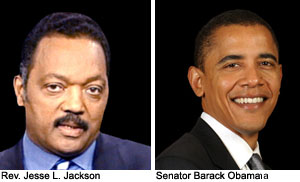By Ron Walters
-Guest Columnist-
Lou Dobbs of CNN prodded his panel the other night to explain what was underneath the awful image of castration used by Rev. Jesse Jackson, Sr., in voicing his frustration with Barack Obama, the presumptive Democratic Party presidential nominee.

His panel completely missed the lively underground disappointment among some Blacks who support Obama, reflected in these two headlines: “Obama Calls For More Responsibility for Black Fathers,” reflecting his speeches recently to large Black audiences such as the Apostolic Church in Chicago and the AME Convention. And another headline, “Obama Brings Economic Message to N. Virginia” in which, before a largely White audience of 10,000, he proposed legislation to ensure equal pay for women, expanded paid family and medical leave, childcare services and pre-school programs, all paid for by reducing the Iraq War funding.
The rhetoric of the moral failure of Black men has helped to nationalize an image of their inferiority. But after serving on a Commission on the Black Male, I have become sensitive to the facts that Black families fall apart–or are never consummated–most often because Black men lack education and or money, and therefore, Black women do not see them as viable partners.
Part of the pressure to get money in the absence of an education pushes Black men into bad choices that result in their disproportionate incarceration or other conditions. So they are often not available as fathers to provide for their families.
This image of the mass irresponsibility of Black males also gives a pass to the difficulty for anyone to accept responsibility for a family where access to the economic resources are difficult and often blocked by racism. Research shows that Black children arrive at most schools three to four years behind White children and their disproportionate poverty places them in schools that do not have resources–in fact there Black students need much greater resources than average just to educate them on an equal basis. The 50 percent dropout rate manifests this result and so, they become fuel for the streets.
They also become fuel for a racist public policy that sweeps them up by racial profiling, targeted neighborhood policing and long sentences into prison, even though 80 percent of them are there for non-violent, petty drug offenses. Where is the outcry for the collective responsibility of government that put them there and therefore, is implicated in their inability to support their families? Where are the bridging programs that effectively connect them to their families while they are in prison?
Rep. Danny Davis of Chicago should be applauded for passage of his Second Chance Act that promises to build a foundation for those just leaving prison, but my discussion with him reveals that it has not been funded.
Barack Obama should be applauded for proposing to create a White House Office on Urban Policy because when Black males go to the street for their livelihood, they will find few positive options because urban policy has been on the backburner of public policy for nearly 30 years now. How did that happen? Ronald Reagan was able to sell America on “personal responsibility” rather than government assistance to blunt charges of racism as implicated in Black progress.
With that support, he was able to take billions of dollars from cities to give to the suburbs, private corporations and the defense establishment.
Therefore, the sensitivity of Blacks to the principle of “personal responsibility” is the awareness of its danger; it has been elevated from a natural act of virtue that Blacks have consistently performed to a powerful political ideology of the right that marginalized the image of Blacks and supported the dramatic shift of government resources out of urban areas. So that, today even a new “urban policy” must be targeted to achieve results.
The sensitivity to the ideology of personal responsibility also reflects the intellectual awareness that in the absence of balanced proposals that also privilege a robust version of the collective responsibility of government, the large structural problems that are faced by the Black community will not be addressed. These problems that ravage cities and their Black neighborhoods now include: the home foreclosure crisis, globalization of the economy and jobs, competition for low-wage employment, depression level unemployment rates, the persistence of poverty and under-education and crumbling infrastructure of urban institutions and places.
This debate should result in both presidential candidates speaking to those needs, giving concrete public policy answers to the question of how they would address them, especially at venues where Black audiences are gathered.
(Dr. Ron Walters is the director of the African American Leadership Center, and professor of government and politics at the University of Maryland College Park. This column was distributed by NNPA.)












